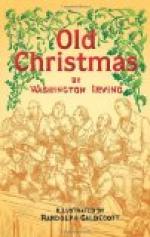[4] See Note D.
“The nation,” continued he, “is altered; we have almost lost our simple, true-hearted peasantry. They have broken asunder from the higher classes, and seem to think their interests are separate. They have become too knowing, and begin to read newspapers, listen to alehouse politicians, and talk of reform. I think one mode to keep them in good humour in these hard times would be for the nobility and gentry to pass more time on their estates, mingle more among the country people, and set the merry old English games going again.”
Such was the good Squire’s project for mitigating public discontent; and, indeed, he had once attempted to put his doctrine in practice, and a few years before had kept open house during the holidays in the old style. The country people, however, did not understand how to play their parts in the scene of hospitality; many uncouth circumstances occurred; the manor was overrun by all the vagrants of the country, and more beggars drawn into the neighbourhood in one week than the parish officers could get rid of in a year. Since then, he had contented himself with inviting the decent part of the neighbouring peasantry to call at the Hall on Christmas Day, and distributing beef, and bread, and ale, among the poor, that they might make merry in their own dwellings.
We had not been long home when the sound of music was heard from a distance. A band of country lads, without coats, their shirt-sleeves fancifully tied with ribands, their hats decorated with greens, and clubs in their hands, were seen advancing up the avenue, followed by a large number of villagers and peasantry. They stopped before the hall door, where the music struck up a peculiar air, and the lads performed a curious and intricate dance, advancing, retreating, and striking their clubs together, keeping exact time to the music; while one, whimsically crowned with a fox’s skin, the tail of which flaunted down his back, kept capering around the skirts of the dance, and rattling a Christmas-box with many antic gesticulations.
The Squire eyed this fanciful exhibition with great interest and delight, and gave me a full account of its origin, which he traced to the times when the Romans held possession of the island; plainly proving that this was a lineal descendant of the sword-dance of the ancients. “It was now,” he said, “nearly extinct, but he had accidentally met with traces of it in the neighbourhood, and had encouraged its revival; though, to tell the truth, it was too apt to be followed up by rough cudgel-play and broken heads in the evening.”
After the dance was concluded, the whole party was entertained with brawn and beef, and stout home-brewed. The Squire himself mingled among the rustics, and was received with awkward demonstrations of deference and regard.
It is true, I perceived two or three of the younger peasants, as they were raising their tankards to their mouths when the Squire’s back was turned, making something of a grimace, and giving each other the wink; but the moment they caught my eye they pulled grave faces, and were exceedingly demure. With Master Simon, however, they all seemed more at their ease.




